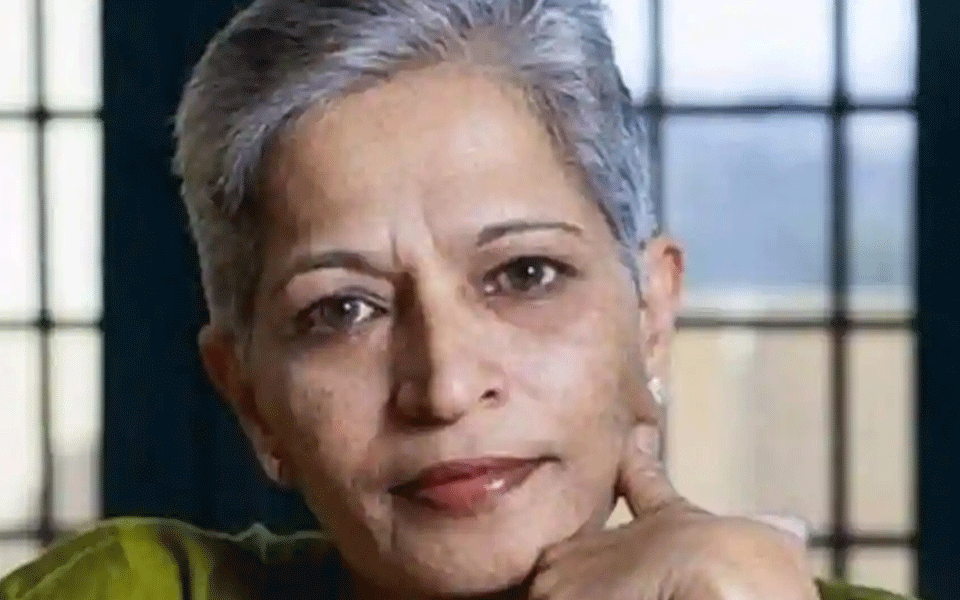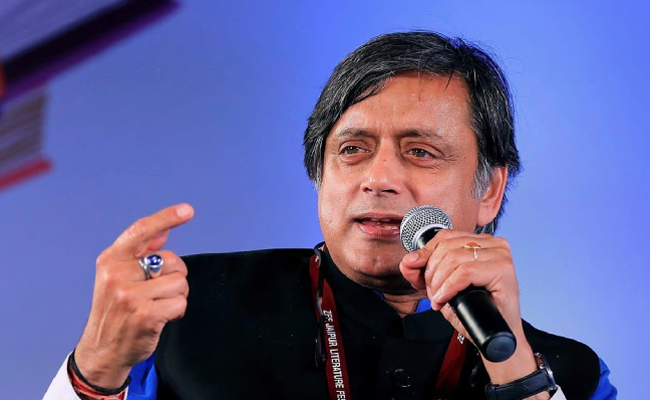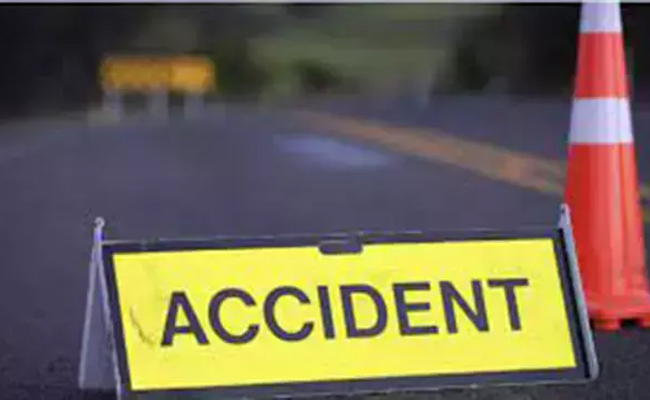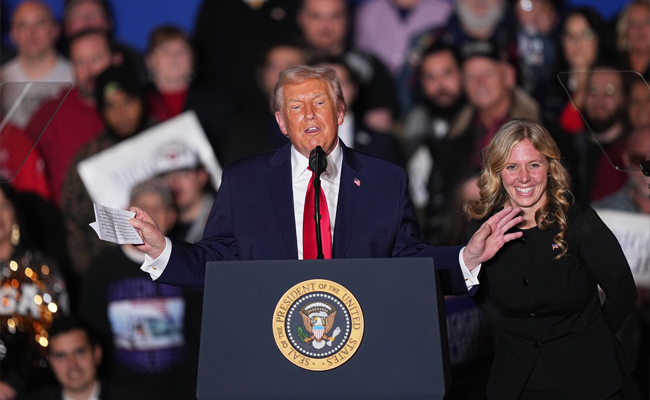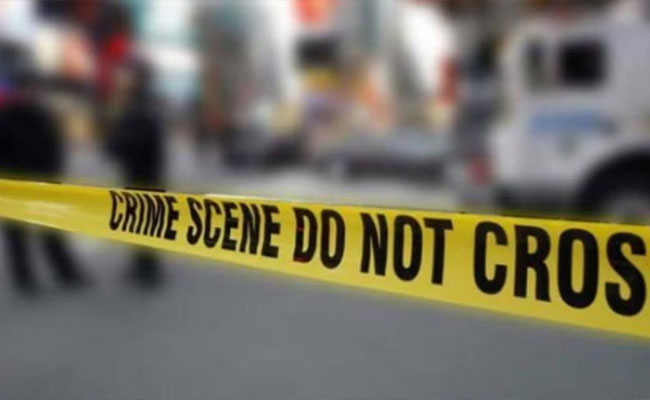Bengaluru, Sep 5 : Marking the first death anniversary of slain journalist Gauri Lankesh, hundreds of people in the city paid moving tributes to her, recalling her chequered life and dogged fight against injustice and inequality.
Gauri, 55, editor of Kannada weekly tabloid 'Lankesh Patrike', was shot dead in front of her house on September 5 night a year ago.
Thought a year-long probe into Gauri's killing by the Karnataka's Special Investigation Team led to the arrest of a dozen suspects, including Parushuram Wagmare, 26, who is alleged to have shot her, and his accomplices, the police are yet to confirm who was or were behind her assassination.
Scores of activists, Kannada writers, journalists, artistes, lawyers and student leaders joined Gauri's family, including elder sister Kavitha Lankesh, in fondly remembering her and paying homage to her soul.
Among those who participated in the day-long activities were social activist Swami Agnivesh, Gujarat legislator Jignesh Mewani, former JNU student leader Kanhaiya Kumar, senior journalists Siddarth Varadarajan and Teesta Setalvad and multi-lingual actor Prakash Raj.
Family members of slain rationalists Govind Pansare and M.M. Kalaburgi also participated at some of the events in the city, organised by the Gauri Memorial Trust and other organisations.
The Gauri Media Trust released the first issue of her tabloid (Lankesh Patrike) in Kannada at the "Freedom of Expression Meet" in Central College, a year after its publication was suspended due to her sudden and untimely death.
A protest march was held from Gandhi statue in Cubbon Park to Raj Bhavan in the city centre, seeking justice to Gauri. Banners and posters carrying her picture and slogans "I Am Gauri" "Long Live Gauri" were carried.
Alleging that the forces that killed Mahatma Gandhi also killed Gauri, Agnivesh said her tragic death had led to the birth of thousands of Gauris across the country.
"We suspect that Hindutva forces are behind her killing as they were in the case of rationalists Narendra Dabholkar, Pansare and Kalburgi," asserted Agnivesh.
Dabholkar was killed on August 20, 2013 at Pune, Pansare on February 20, 2015 in Mumbai and Kalburgi on August 30, 2015.
Said Kavitha: "We are living in dangerous times as the people who are opposed to fascism and authoritarianism are being arrested and jailed."
Recalling that Gauri's killing had changed his world view, actor Raj said narratives were being changed by the powers that be to silence the voices of dissent and fairness.
"We take our democracy for granted; often ignoring the price that people pay. Make no mistake, our democracy is alive because of the courage of people like Gauri. They chose to face death so that our democracy could live. We resolve to take your struggle forward," tweeted former JNU student leader Kanhaiya.
Sharing a picture of him with Gauri, Mevani tweeted that the shirt he wore for the occasion was gifted by Gauri.
Supreme Court lawyer Prashant Bhushan of Swaraj Abhiyan said of the killers: "They (suspects) belong to several Hindutva (organisations) who were also making bombs to blow up Ganpati Mandaps and churches and Eid gatherings. (People) who celebrated her killing are still in power."
Karnataka Deputy Chief Minister G. Parameshwara said even a year after her death, Gauri continued to live on among thousands of voices she has inspired.
"You can silence people but not ideas. My heartfelt remembrance to this brave soul," tweeted Parameshwara, who also holds the Home portfolio.
Let the Truth be known. If you read VB and like VB, please be a VB Supporter and Help us deliver the Truth to one and all.
New Delhi (PTI): Congress leader Shashi Tharoor on Saturday, while lauding the win of the UDF in Kerala local bodies elections, also congratulated the BJP for its historic performance in his Thiruvananthapuram constituency, calling it the "beauty of democracy".
In a post on X, he said the people's verdict must be respected, whether for the UDF overall or for the BJP in his constituency.
"What a day of amazing results in the Kerala local self-government elections! The mandate is clear, and the democratic spirit of the state shines through.
"A huge congratulations to @UDFKerala for a truly impressive win across various local bodies! This is a massive endorsement and a powerful signal ahead of the state legislative elections. Hard work, a strong message and anti-incumbency have all clearly paid off to achieve a much better result than in 2020," Tharoor said.
He said he also acknowledges the historic performance of the BJP in Thiruvananthapuram, and "offer humble congratulations on their significant victory in the city corporation - a strong showing that marks a notable shift in the capital's political landscape."
Tharoor said he campaigned for a change from 45 years of the LDF "misrule", but the voters have ultimately rewarded another party that also sought a clear change in governance.
"That is the beauty of democracy. The people's verdict must be respected, whether for the UDF overall or for the BJP in my constituency.
"We will continue to work for the betterment of Kerala, advocating for the people's needs and upholding the principles of good governance. Onwards and upwards!" Tharoor, who is the MP from Thiruvananthapuram, said.
The lotus bloomed in the state capital as the BJP-led NDA achieved a resounding win in the polls for the Thiruvananthapuram Corporation, snatching it from the CPI(M)-led LDF and marking an end to 45 years of continuous Left rule in the local body.
The win in the Thiruvananthapuram Corporation will act as a boost for the BJP in the 2026 Assembly polls, especially in the state capital.
Of the 101 wards in the Thiruvananthapuram Corporation, the BJP won 50, LDF 29, UDF 19 and two wards were won by independent candidates.
The BJP is one seat short of a decisive majority in the corporation.
Besides this, the NDA retained the Palakkad municipality after a close battle with the Congress-led UDF and wrested the Thrippunithura Municipality from the grand old party.
In Thrissur, from where Suresh Gopi won in the Lok Sabha polls last year, the BJP won 18 out of the 46 wards in Kodungallur Municipality, eight in Thrissur Corporation, two each in Guruvayoor and Vadakkancherry municipalities, seven in Kunnamkulam Municipality, six in Irinjalakuda Municipality and one in Chalakudy Municipality.

